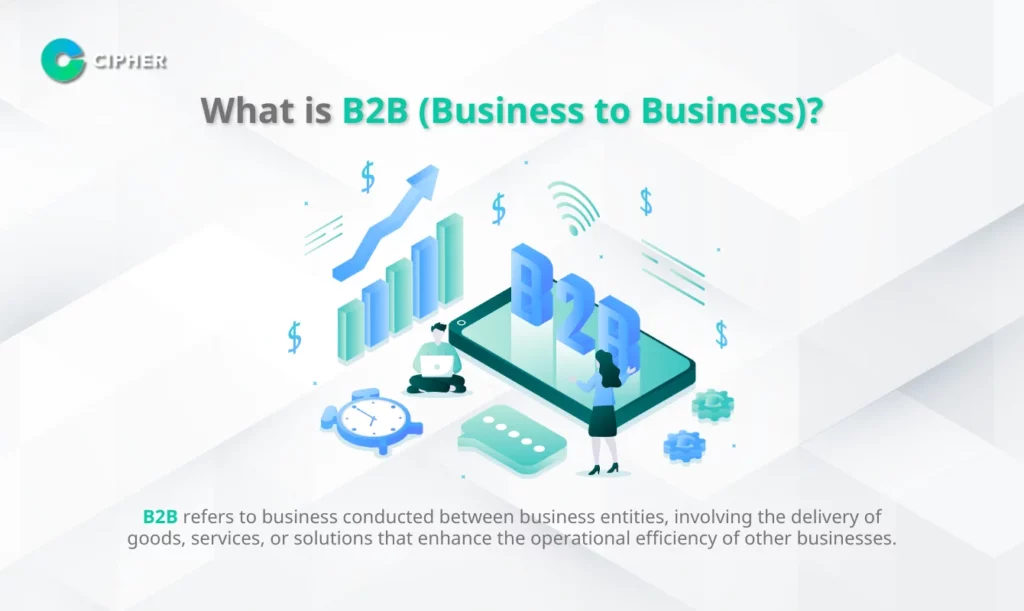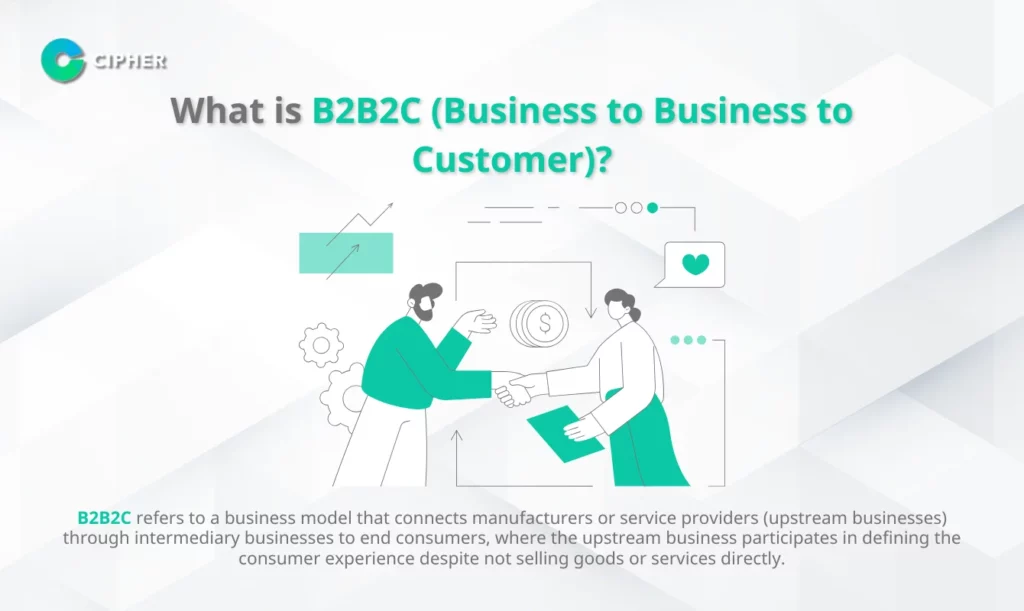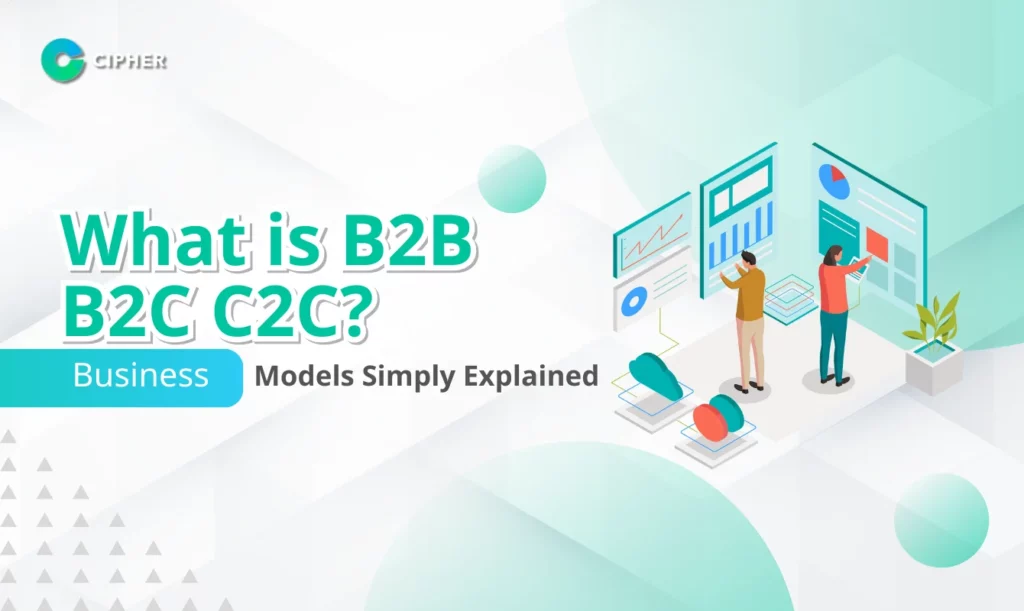Table of Contents
What is B2B B2C C2C refers to business models that differ in their target audiences and operational methods. Each business type has distinct advantages and limitations. Choosing the appropriate model is a crucial factor affecting business success today. Entrepreneurs should understand the differences between B2B, B2C, and C2C to select the approach that best fits their business. In this article, CIPHER, a provider of website development and management services for businesses, will explore these business models in depth, along with suitable marketing strategies for each.
What is B2B (Business to Business)?

B2B refers to business conducted between business entities, involving the delivery of goods, services, or solutions that enhance the operational efficiency of other businesses. Products and services in B2B businesses typically have high value and involve complex purchasing decisions, as they require approval from various departments within an organization. Examples include companies that supply raw materials to manufacturing plants or businesses providing software systems for organizations.
How are B2B, B2C, and C2C Different?
What is B2B B2C C2C? These are fundamentally different business models. B2B refers to business-to-business transactions that emphasize long-term relationships and involve complex decision-making processes. This differs from B2C, where businesses sell products or services directly to general consumers, focusing on quick, emotion-driven purchasing decisions. C2C refers to transactions between consumers facilitated by a platform. Each type has different marketing strategies and target audiences.
What is B2B (Business to Business)?
B2B business refers to operations between organizations, such as manufacturers and distributors, wholesalers and retailers, or service providers and client companies. Products and services traded in the B2B model are used in business processes rather than for direct consumption. Transactions are often complex, require long decision-making periods, and typically involve long-term contracts to build sustainable business relationships.
What is B2C (Business to Customer)?
B2C refers to a business model where goods or services are sold directly from businesses to end consumers. The B2C business model focuses on meeting the needs of general consumers, with faster decision-making processes driven by emotions and personal satisfaction. Examples of businesses in this format include retail stores, restaurants, beauty clinics, or online shopping platforms that sell products directly to consumers.
What is C2C (Customer to Customer)?
C2C refers to a business model that allows consumers to buy, sell, or exchange goods or services among themselves with a platform serving as an intermediary. The C2C business model creates a space for consumers to meet and conduct transactions directly. The platform facilitates and builds credibility in buying and selling, such as auction websites, online marketplaces for second-hand goods, or freelance work platforms.
What are the Highlights of B2B Marketing?
The highlight of marketing in B2B business is the focus on building long-term relationships with corporate customers by presenting value that helps solve problems or improves business efficiency. B2B businesses emphasize building credibility by demonstrating business expertise, providing useful information, and presenting approaches that address the specific needs of each organization. Additionally, B2B marketing emphasizes reason, in-depth information, and return on investment rather than emotional stimulation as in the B2C model.
Recommended Marketing Strategies Suitable for B2B Businesses
B2B business requires marketing strategies that focus on building long-term relationships and expertise to acquire high-potential leads or customer lists. It requires diverse and effective strategies both online and offline. For businesses starting to market or looking for E-Commerce strategies for B2B businesses, it’s essential to understand the meaning to apply appropriately to their business model.
What is B2B Marketing?
B2B marketing refers to the process of planning and conducting marketing activities that focus on building relationships between businesses and organizational customers to stimulate long-term sales and collaboration. B2B marketing uses various tools and strategies, from creating valuable content, organizing seminars or workshops, participating in trade shows, to using various digital channels to demonstrate expertise and value that businesses can deliver to organizational customers.
SEO Marketing
SEO Marketing for B2B businesses refers to the strategy of optimizing websites and creating quality content to rank high in Google search results for keywords relevant to that industry. Since decision-makers in organizations often search for information online before contacting service providers, SEO helps increase credibility and opportunities to reach target audiences looking for options at the right time, leading to competitive advantages and increased chances of acquiring new customers, such as Conducting B2B business with E-Commerce platforms.
Marketing Automation
Marketing Automation in B2B business refers to using technology to manage and automate marketing processes, helping businesses deliver appropriate information to target audiences at the right time without having to conduct everything manually. This system helps manage leads, track customer behavior, and send customized messages or content tailored to each individual, saving time, increasing work efficiency, and creating good experiences for organizational customers.
Niche Marketing
Niche Marketing for B2B refers to the strategy of focusing on specific market segments that are small but have high potential, rather than competing in broad markets with high competition. This type of marketing is suitable for B2B businesses because organizational customers often need options that meet specific needs. Businesses must understand the problems and needs of the target audience to develop products or services that meet requirements and communicate value precisely to establish expertise in that specialized market.
Social Media Marketing
Social Media Marketing in B2B business refers to using social media platforms to create awareness, demonstrate expertise, and build relationships with organizational target audiences. Effective platforms for B2B include LinkedIn, Twitter, and Facebook, used to share valuable articles, case studies, educational videos, and business news. Therefore, good Social Media practices aren’t just about selling products but creating communities and showing that the business understands problems and is ready to support future customers.
Account-Based Marketing
Account-Based Marketing (ABM) in B2B refers to a strategy that focuses marketing and sales on specific target companies or organizations, rather than broad marketing. ABM emphasizes deep penetration into each target company by studying the needs, problems, and decision-making structures of each organization, then creating marketing campaigns for that specific organization, which helps increase resource efficiency and opportunities to close sales with customers.
CRM Marketing
CRM Marketing in B2B business refers to using Customer Relationship Management systems to collect, analyze, and use customer data to improve marketing and sales strategies. CRM systems help businesses understand the behavior and needs of each customer, track engagement with the brand across various channels, and present information or offers at appropriate times, which helps increase customer satisfaction, customer retention rates, and sales opportunities.
Email Marketing
Email Marketing in B2B refers to communicating and building relationships with organizational customers through email, which remains an effective method of reaching decision-makers in organizations. This strategy covers sending emails, educational articles, case studies, to various promotions. Content must be quality, relevant, and suitable for recipients’ needs. Segmenting email recipients by business helps increase campaign effectiveness and better customer engagement.
What is B2B2C (Business to Business to Customer)?

B2B2C refers to a business model that connects manufacturers or service providers (upstream businesses) through intermediary businesses to end consumers, where the upstream business participates in defining the consumer experience despite not selling goods or services directly. B2B2C often takes the form of online trading platforms that gather multiple sellers in one place, such as Lazada, Shopee, or Amazon, allowing brands and stores to reach consumers directly under platforms that already have credibility and a large customer base.
How is B2B Different from B2B2C?
B2B refers to a business model that focuses on selling goods or services between businesses only, where end consumers are not directly involved in the buying and selling process. B2B2C refers to a format where upstream businesses (manufacturers or service providers) sell goods or services through intermediary businesses, or in other words, act as intermediaries in bringing products to sell to customers.
The main difference between B2B and B2B2C is the level of access to end consumers and brand control. In the B2B model, the primary relationship is between the upstream and downstream businesses, but in B2B2C, the upstream business can create brand awareness and have communication channels with end consumers, albeit through the intermediary business’s platform, which helps the upstream business better understand consumer needs.
Interested in B2B, B2C, C2C? You Can Use CIPHER Services Today
What is B2B B2C C2C? These are business models that require different online marketing strategies. CIPHER is ready to provide comprehensive services for all your online business development needs, regardless of format, with professional experience and expertise.
- Comprehensive SEO Services: Optimize your website to rank on the first page of Google with correct and sustainable techniques.
- High-Quality Website Development: Design and develop websites that meet the needs of B2B, B2C, and C2C businesses with secure and efficient systems.
- E-Commerce Solution: Provide consultation and set up online store systems suitable for your business type, along with Marketing Automation Services that cover every step.
- Content Marketing: Create valuable content, attract target audiences, and build credibility for your brand.
- Social Media Management: Comprehensive social media management to create awareness and engagement with target audiences.
- Digital Marketing Strategy: Plan comprehensive online marketing strategies suitable for your business model.
Summary
What is B2B B2C C2C? These are business models that differ in target audiences, purchasing decision processes, and marketing strategies. Choosing the appropriate business model depends on the goods or services, expertise, and business goals. Whether it’s B2B selling between businesses, B2C selling directly to consumers, or C2C creating platforms for customers to trade among themselves, all models have different advantages and challenges.
However, understanding what is B2B B2C C2C and applying appropriate marketing strategies for your business type is important for sustainable business growth. CIPHER is ready to be your business partner to help you succeed online, regardless of your business format.
Frequently Asked Questions (FAQs)
What is B2B Selling?
B2B selling refers to the process of selling goods or services from one business to another, with specific characteristics that differ from B2C selling due to more complex decision-making processes, multiple stakeholders involved in decisions, and a focus on building long-term relationships. Selling in B2B businesses requires understanding the needs of client organizations, presenting value that products or services can help solve problems or increase work efficiency, and providing clear information about return on investment (ROI) to support decision-making.
What B2B2C Businesses are in Thailand?
B2B2C (Business to Business to Consumer) businesses in Thailand have been growing continuously as business models that connect producers, distributors, and customers. Outstanding examples include E-Commerce platforms like Shopee, Lazada, and NocNoc, which gather various brands in one place, helping consumers access a variety of products.
What B2B Businesses are in Thailand?
Business to Business or B2B businesses in Thailand play an important role in driving the economic system, providing services or selling products between businesses. Examples of outstanding B2B businesses in Thailand include:
- Ocean Sky Network Co., Ltd.: Provider of online market data analysis services, helping businesses make decisions through in-depth information.
- Revomed (Thailand) Co., Ltd.: Factory manufacturing cosmetics, health products, beauty, and supplements for various brands.
- Tip Holding Co., Ltd.: Provider of factory rentals, warehouse rentals, and large distribution centers to other businesses.
- SCG: Manufacturer and distributor of construction materials and chemicals to companies in various industries.
- Digital Ventures: A joint venture of Siam Commercial Bank providing innovation and technology services to various businesses.
What is C2C Business?
C2C (Consumer to Consumer) business refers to business conducted between consumers themselves, which may involve selling second-hand items, handmade items, or self-produced goods but in small quantities. Examples include selling products through Facebook Marketplace groups or platforms like Kaidee.





